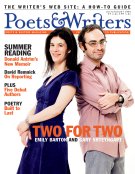In this occasional feature, we ask authors to list the movies, music, artwork, and books that inspired them during the course of writing their new books. In the last issue, we heard from A. M. Homes, who listed Joan Didion's The White Album (Simon & Schuster, 1979) and The White Album (1968) by the Beatles as influential in the writing of her latest novel. For this second installment, we asked two-time Booker Prize–winning author Peter Carey, whose ninth novel was published by Knopf in May, for his list. He replied with the essay below. In Carey's Theft: A Love Story, Michael "Butcher" Boone, a once famous and now angry painter living in a remote country house, and Hugh, his "damaged two-hundred-and-twenty-pound brother," are embroiled in a high-stakes art heist after a beautiful young woman named Marlene Leibovitz, wearing three-inch Manolo Blahnik heels, walks into their lives.
After a book is finally written, one looks back at it as if a fit of drunkenness has passed. That is to say, a stranger wrote the sentences, and it is often difficult to remember exactly what crazy shit he did. I have notebooks, of course, but I don't revisit them. Sometimes I stumble upon scraps of ideas I scrawled on pages of other writers' novels. Thus, on the end papers of The Good Soldier (John Lane, 1915) by Ford Madox Ford, I found, just recently: "The start of the story of Marlene Leibovitz—he did not even like her, was aggressive, did everything he could to drive her away." Was it Ford who prompted me to sketch the beginning of my love story in the back of his treasure? I don't know.
I have similar scribbles in Bruno Schultz's Street of Crocodiles (Walker, 1963) and Joseph Conrad's Nostromo (Harper, 1904), both of which I enjoyed during this period. These notes say more about the unrelenting self-absorption of the working writer than what effect the huge magnetic forces of Schultz and Conrad had upon my overexcited brain.
Other books, of course, I deliberately raided or tried to raid. Agnes Martin's Writings (Kunstmuseum Winterthur/Cantz, 1992), for instance. Also Out of the Picture: Milton Resnick and the New York School (Midmarch Arts Press, 2003), a work charged with the brawling, confused, competitive, opinionated air of the panels at the Studio Club in 1968. Resnick left his mark on me, but it was Mark Stevens and Annalyn Swan's De Kooning: An American Master (Knopf, 2004) that blew me away—so strong on character, so viscerally and intelligently connected to paint. I came to it too late in the writing process for it to affect the shape of anything, but Stevens and Swan might as well know why my Butcher Bones bought his cans of black and white house paint.
De Kooning was one of the best contemporary books I read during those years, a feast for someone who is still annoyed with the megalomaniacal Clement Greenberg for his sometimes dismissive assessments of de Kooning's work in his Collected Essays and Criticism (University of Chicago, 1986-93).
I read Michael Cunningham's Specimen's Days (Farrar, Straus and Giroux, 2005) for the sheer pleasure of swimming in the river of his prose, and listened continuously to Gavin Bryars's recording The Sinking of the Titanic (1994), not so much for the title composition but for the second work, titled "Jesus' Blood Never Failed Me Yet." This has as its spine a recording of a tramp in London's Euston Station singing this sad, haunting, very lovely little hymn. Bryars loops the song and it repeats, always starting, almost ending, while the voice is joined slowly, always sympathetically, by strings, then guitar, woodwind—nine instrument groups in all. Listening to "Jesus' Blood" again as I write this, the tramp reminds me of my dear, damaged Hugh in Theft.
Peter Carey received the Booker Prize for Oscar and Lucinda (Harper & Row, 1988), and again for True History of the Kelly Gang (Knopf, 2000). His most recent book is Theft: A Love Story, published by Knopf in May.








